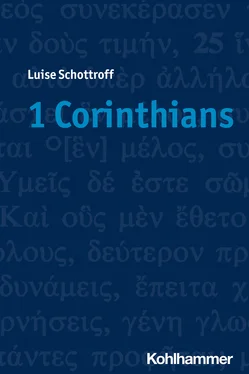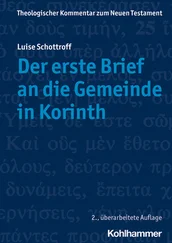Luise Schottroff - 1 Corinthians
Здесь есть возможность читать онлайн «Luise Schottroff - 1 Corinthians» — ознакомительный отрывок электронной книги совершенно бесплатно, а после прочтения отрывка купить полную версию. В некоторых случаях можно слушать аудио, скачать через торрент в формате fb2 и присутствует краткое содержание. Жанр: unrecognised, на английском языке. Описание произведения, (предисловие) а так же отзывы посетителей доступны на портале библиотеки ЛибКат.
- Название:1 Corinthians
- Автор:
- Жанр:
- Год:неизвестен
- ISBN:нет данных
- Рейтинг книги:5 / 5. Голосов: 1
-
Избранное:Добавить в избранное
- Отзывы:
-
Ваша оценка:
- 100
- 1
- 2
- 3
- 4
- 5
1 Corinthians: краткое содержание, описание и аннотация
Предлагаем к чтению аннотацию, описание, краткое содержание или предисловие (зависит от того, что написал сам автор книги «1 Corinthians»). Если вы не нашли необходимую информацию о книге — напишите в комментариях, мы постараемся отыскать её.
The English version is based on the German 2nd edition. It was translated by Everett R. Kalin, Professor Emeritus for New Testament at Pacific Lutheran Theological Seminary at Berkely/CA.
1 Corinthians — читать онлайн ознакомительный отрывок
Ниже представлен текст книги, разбитый по страницам. Система сохранения места последней прочитанной страницы, позволяет с удобством читать онлайн бесплатно книгу «1 Corinthians», без необходимости каждый раз заново искать на чём Вы остановились. Поставьте закладку, и сможете в любой момент перейти на страницу, на которой закончили чтение.
Интервал:
Закладка:
3:3–4should not have been understood as a polemic but as a critique that points to the kind of structures revealed in conflicts and strife: the clueless accommodation to societal power struggles aimed at oppressing other people. Kata anthrōpon (cf. the use of the word anthrōpos in 1:25; 2:5 and 3:4), »the way people usually operate,« is not devaluing human life as such. Rather it deals with societal structures that destroy rather than edify: being human apart from God. Persuasiveness gets its illuminating argument from the fact that it can presuppose that is precisely what the hearers do not want. They want to live in accord with God’s will.
3:4 refers to 1:11–13. Here he is clearly criticizing them; that is the solid food (3:2) that to this point Paul has served up only in smaller portions.
3:5–11
5 For who is Apollos, and who is Paul? We have both labored to see that your trust in God grows, both just as we were commissioned by the Eternal One. 6 I have planted, Apollos has watered, but it is God that has given the growth. 7 God gives the growth, so it is not important who plants or who waters. 8 The one who plants or the one who waters does it in community. Yet both will receive their own reward in accord with their work.
9 We are working together with God. God’s field, God’s edifice, that’s what you are. 10 Since the grace has been given to me by God, I have worked on the foundation like a clever master-builder. Others are continuing to build. The one who is continuing to build should think about how the work is proceeding. 11 No one can lay a foundation other than the one that has already been laid by God. That foundation is Jesus the Messiah.
3:5Paul’s view is that in the controversies he and Apollos were played off over against one another. Therefore, Paul now lays out in detail his relationship to Apollos and the significance of both for the congregation in Corinth (until 4:6). His intention with this is to make clear that they have not been in competition and are also not suitable candidates for serving as the basis of competition among members of the congregation. He says that clearly toward the end of his exposition on the theme of Paul and Apollos (in 4:6). His exposition contains fundamental statements about his theological view of a congregation and of his relationship to it.
Apollos is also known from Acts (18:24–28; 19.1). He was a highly educated Jew who knew that he belonged to the Messiah Jesus. He spoke about this in the synagogue in Ephesus and met there Prisca and Aquila. They helped him gain additional insight, likely through precise instruction about baptism in the name of Jesus. The messianic congregation in Ephesus gave him a letter of introduction to the congregation in Corinth. There he was found to be very helpful, since through Torah interpretation he showed Jews in Corinth that Jesus was the Messiah of Israel (and of the nations?). This account in Acts agrees with what Paul himself reports. In 1 Cor 3:5 he identifies himself and Apollos in equal measure as servants assigned by God for the sake of the congregation ( diakonoi ; cf. 3:9, coworkers for God). Both have differing mandates from God. What »serving« means here is shown by what follows, beginning with 3:6.
In 3:6–11 Paul uses two images that are meant to elucidate 3:5: one image from gardening and the other from building houses. Apollos and Paul are peers in their work in the garden or on the house. What is decisive in both cases, however, is what comes from God: the growth (3:6) and the foundation (3:11).
3:6The planting and watering likely refer to gardening, since agricultural fields are as a rule not watered artificially. 165It is doubtful that it was important for Paul to say that he had founded the congregation (see above on 2:3). Here his only concern is the chronological sequence of his work and that of Apollos. That Paul was in Corinth before Apollos is also said by Acts.
3:7stresses that their work was of equal value and the decisive importance for that work of what God does.
3:8Once again the solidarity of the two workers is expressed: they are one, but they will be rewarded individually, based on what they have done; cf. 3:12–15.
3:9Apollos and Paul are God’s coworkers in God’s planting and in God’s building. In the history of interpretation there have been dogmatic reservations about seeing people as God’s coworkers, and therefore there are interpretations that apply the syn- (with/[»co«-]) in the word synergoi [»coworkers«] to the working together of Paul and Apollos. 166But this interpretation is linguistically unconvincing. Moreover, in the context it is important to recognize the presence of God’s activity even in the work of humans; see 3:10–11. Beyond all that, in the history of interpretation there have been interpretive models that depict Paul, in his relationship to the congregation as an absolute authority. 3:6–9 speaks a different language: the land/the planting and the building are God’s work, and God’s coworkers are those who carry out the work in obedience to God’s command, diakonoi (3:5). 167
3:10–11In 3:9b Paul has begun a comparison in which a building depicts the congregation. It continues until 3:17. From 3:12 on, it is seen that he understands the building to be God’s temple.
In 3:10 Paul begins by saying that as a wise master builder he laid the building’s foundation. The foundation 168is the first part of the building; the architektōn is the master builder. 169Paul was commissioned by God and was the first to work on this building. It is not his intention in saying this to attribute to himself, as the one who founded the congregation, a greater role than that of others who have continued to work on the building, as he himself has also. He began, others are continuing. In 3:11 he then speaks of the foundation »that has been laid.« He doesn’t say »that I have laid.« Thus, it is no big leap to interpret keimenon /»that has been laid« as a passivum divinum : Godhas laid the foundation. For Paul, this does not contradict 3:10. He is speaking of the subject under discussion, not the image used to speak of it. God was at work when the edifice »congregation« came into being. The foundation, the first part of the building, is Jesus, the Messiah. He does not say: the foundation is the proclamation about the Messiah Jesus. The foundation is the Messiah himself. The image is shattered. Something similar occurs with the image of the body of Christ in Chapter 12 (see on 12:12–27). The congregation is the body of Christ—it is not merely compared with a body. The Messiah is the foundation; the congregation is not merely compared with a building. It is the house, in which God dwells (see 3:16).
3:12–17
12 Whoever builds upon the foundation, with gold, silver, precious stones, wood, straw, reeds—13 the share of all individuals will become visible. The day will bring it to light. For it will be revealed in the fire. The fire will test the quality of the work of all. 14 For the part that you have added on, you will receive a reward, if it remains standing. 15 For the part that burns up, you will bear the consequences, but you will nevertheless be saved, as out of a burning house.
16 Do you not know that you are God’s temple and God’s Spirit dwells within you? 17 Whoever destroys God’s temple, will him- or herself experience destruction. For the temple of God is holy, and that temple is you.
All those who are involved in the building of the congregation must give an account before God. God tests the quality of the building—Paul is speaking parabolically here. The building catches fire. From God’s perspective, that is a moment of truth for those who are doing the building. Paul takes this image from the reality of fires in the large Hellenistic-Roman cities. He calls this test by fire the »Day« (3:13). The concept of the Day of God and of the fire of judgment is part of the biblical tradition. Paul is thinking here of a testing by fire—being put to the test by God. But it should not be equated with God’s judgment at the end time (see 3:15; cf. 11:32). Rather, he envisions a test by God that instructs those who have failed. In his image of the congregation as a building, Paul has in view the work of building a temple, as he had presumably seen, for example, in the ongoing construction of the Herodian temple in Jerusalem. 170He shows that he has knowledge of the topic he is discussing as 3:12and other verses show. Here he enumerates building materials in the awareness that the builders must take their flammability into account. So, what is built on the foundation also requires competence in those who direct the construction, for only such builders can make those kinds of decisions. From this we learn that he, as the architect (3:10), has no desire to set himself above the other builders. He names the following materials: gold and silver—they were, for example, used for temples. 171Then he mentions »costly stones.« The Septuagint speaks of the use of »great costly stones« for a foundation or superstructure of a temple and a royal palace (3 Kings 6:2; 7:46–50). 172Therefore, it seems natural, with reference to the »costly stones,« not to think of precious stones. Also favoring this view is the fact that Paul speaks so knowledgably about his images. Finally, stone is the crucial building material for each building. The process of working on the great blocks of stone before their use is elaborate, 173so that the word »costly« for the blocks of stone is appropriate. The precious stones used to adorn the Jerusalem that is to come, as in Rev 21:19–21, are, to be sure, also to be taken into consideration for determining the interpretation of the stones in 3:12. However, Paul is speaking here of large buildings he has seen with his own eyes; therefore, the interpretation that settles on blocks of stone is to be preferred. The last three words enumerating construction materials refer to roofing shingles, 174hay and straw. In Hellenistic construction they were not used for large urban buildings but for »rural dwellings in poorer regions.« 175Paul speaks about the materials and about fire safety like an ancient builder. 1763:16–17 are concluding solemn sentences about the congregation as God’s temple.
Читать дальшеИнтервал:
Закладка:
Похожие книги на «1 Corinthians»
Представляем Вашему вниманию похожие книги на «1 Corinthians» списком для выбора. Мы отобрали схожую по названию и смыслу литературу в надежде предоставить читателям больше вариантов отыскать новые, интересные, ещё непрочитанные произведения.
Обсуждение, отзывы о книге «1 Corinthians» и просто собственные мнения читателей. Оставьте ваши комментарии, напишите, что Вы думаете о произведении, его смысле или главных героях. Укажите что конкретно понравилось, а что нет, и почему Вы так считаете.












